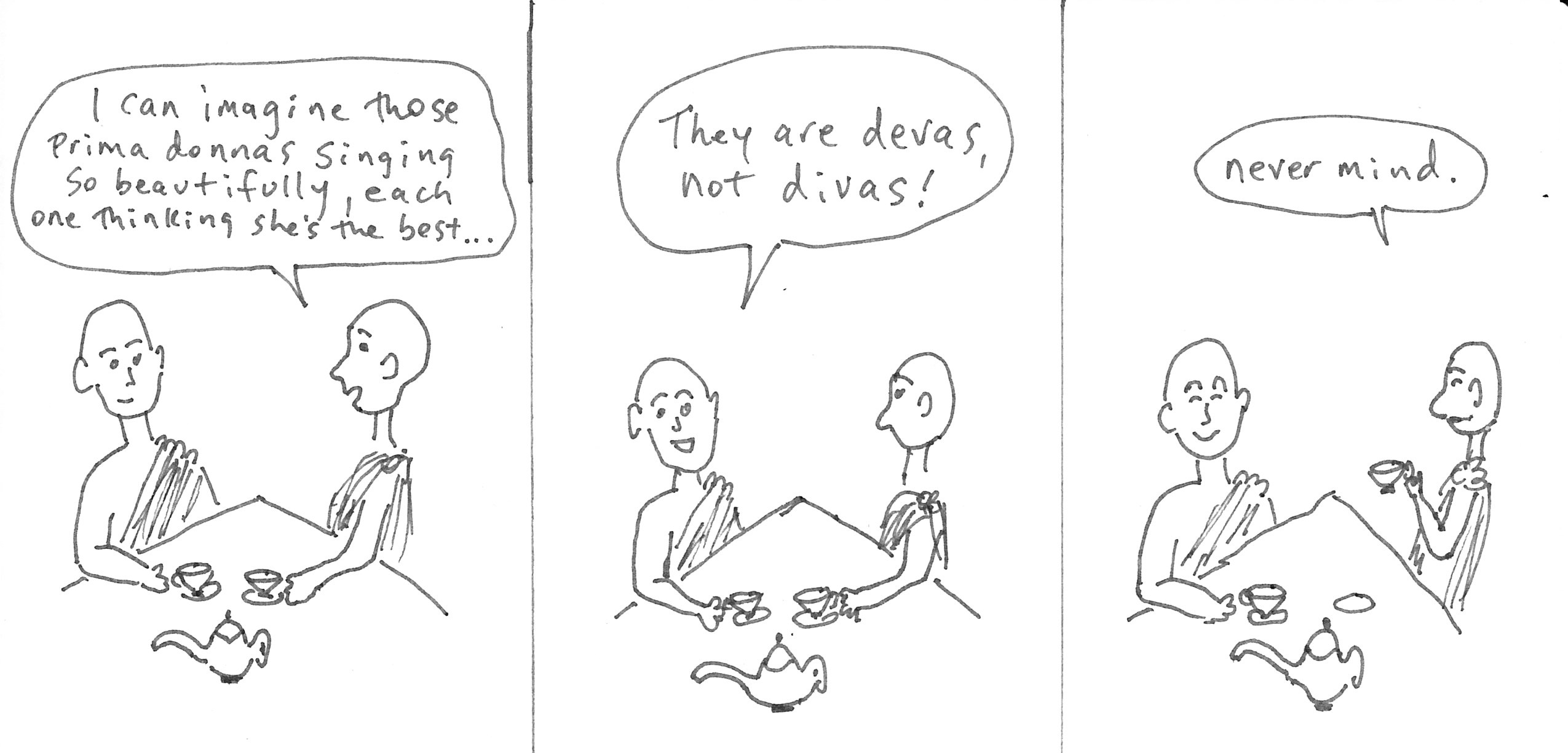Yes, because ‘deva’ literally means ‘radiant’ and brahmas are also radiant beings. But the devas in the sensual planes are never referred to as ‘brahmas’, which means that we are talking about two distinct types of beings even though they all happen to be radiant.
Bhante, some of you seem to like to make the argument that the original meaning of words is final. I just don’t buy that argument. I’ve never thought of language that way.
I don’t think I’ve ever met a single Theravada monk who hasn’t referred to ‘brahmacariya’ as ‘the Holy Life’ in English, without any Buddhist going into shock due to the fact that originally the word holy has its sanctity directly from God. Languages change. Words take on new meanings.
Respectfully, bhante: if the fact that ‘deva’ and ‘brahma’ are two completely different words with completely different meanings in Pali isn’t a compelling enough argument against calling them both ‘gods’ in English, then I don’t think there is any argument that’s compelling enough for you.
In the OP I showed how ‘brahma’ is used both for the highest beings in samsara (obviously not including ariya-puggalas since they transcend samsara) and to describe other things that are of “the highest & best qualities, sublime, ideal best, very great”. I argued that since devas are not describes in those terms it’s incorrect to bundle them together with brahmas as just ‘gods’.
I also pointed to how differently the Buddha spoke about the two types of beings, how it would’ve been considered unworthy of a bhikkhu or bhikkhuni to choose the Holy Life in order to get a rebirth as a deva, while the Buddha himself said that a mendicant who experiences jhana (i.e. a brahma state) even for a split second is worthy of their almsfood.
A factor that I’ve only hinted at in earlier comments, for why we need a clear distinction between devas and brahmas, is that a deva rebirth only requires morality and generosity, while a brahma rebirth requires a high level of spiritual cultivation, i.e. samadhi, renunciation, mental purification, detachment - qualities that the Buddha respected even in non-Buddhist mendicants.
This too is a very compelling argument to me. Perhaps it’s the strongest argument of all to why devas shouldn’t be called gods. If becoming a god doesn’t require deep spiritual/mental cultivation I don’t even know what we’re talking about here.
To me these are all very solid/compelling arguments for why devas and brahmas shouldn’t be given equal status as ‘gods’. I don’t know what other argument anyone could possibly need.
I don’t know what you base that idea on, because the Norse had a clear cosmological map where the Æsir of Valhalla were placed on the highest branches of the tree Yggdrasil, which represented the entire cosmos. And the Greek assumed that their highest peak, Mount Olympus, was the highest place in the entire world, and that the beings who lived there were therefore also the highest in the universe.
That’s simply not true. Many of the myths surrounding these deities have nothing to do with their relationship to humans and everything to do with their struggles to keep control over the universe so that it wouldn’t fall into chaos and destruction. The myths also describe how the various beings were created and how the world came into existence through these beings.
And the “gods” of there religions were also worshipped - not only bribed for favours. We know very little about the mystical practices of the Norse and Greek mythologies, but there are theories that mystical initiation rites included psychoactive drugs that allowed the initiatee to see how the gods controlled the world, so that their faith would be replaced with knowledge.
These religions were much more complex than just “give the gods oblations so they do us favours”.
You’re proving my point here. That’s exactly why I think that devas shouldn’t be called ‘gods’ while brahmas should. Because even the Lord of all devas, king Sakka, was in fact viewed as a sort of nature spirit; one who influenced the weather.
Regardless of what (European) people called these deities in the past, to us Buddhists it’s clear that they were referring to beings in the sensual realms - worlds where there are different genders, beings have sex, there are wars between certain beings, e.g. between the Æair and the giants, or between Sakka’s armies and the Asuras.
That’s vastly different from the peaceful and ecstatic brahma realms, where beings dwell in samadhi for aeons and there are absolutely no conflicts or sensual indulgences.
